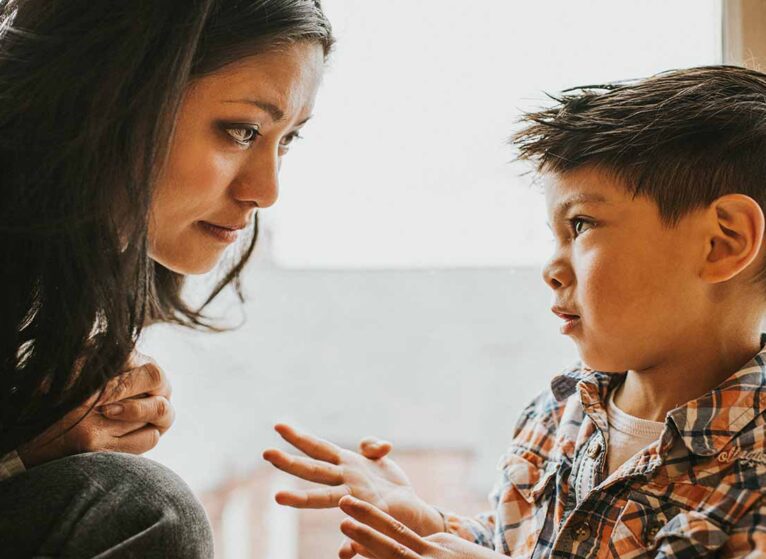If your child is having suicidal thoughts or another mental health crisis, please find help right away. If you're in the Charlottesville/Albemarle area, call the regional crisis line at 434.230.9704. Otherwise, call or text 988 to reach the national Suicide and Crisis Lifeline. To learn more about talking to your kids about suicide before it becomes an emergency, read on.
As a parent, news from UVA Health about a big increase in kids attempting suicide with poison was eye opening. In 2021, the rate of attempted suicide by poisoning rose 30% in kids aged 10-19. It’s a huge jump. But the biggest jump, 78%, was in kids aged 10-12.
Obviously, this is a big deal and we need to talk to our kids about it. But how? What do we say? How early do we need to start talking about it? Could we be giving them ideas?
These are tough questions for any parent. So we turned to Haley Stephens, PhD, a pediatric psychologist at UVA Children’s. Her answer: Don’t wait. Start talking about it early. How you talk about it depends on your child’s age and stage of development.
Still unsure? Don’t stress. Stephens breaks down for us what to say at every age.
Different Conversations for Different Ages
When kids as young as 6 are dying by suicide, we can’t afford to wait for the conversation. Instead, we should handle it the same way we handle other serious threats. Start conversations early that we can build on as our children age.
Is Your Child in Crisis?
Trained volunteers at the National Suicide and Crisis Lifeline can help 24/7/365.
Ages 2-4
Start by talking about emotions. Even this young, kids know some emotions feel so big they can hardly manage them. We’ve all seen a toddler suddenly fall to the ground because they were told no.
Talk about how those emotions feel big but they can control them. A big part of making these conversations healthy is not judging the feelings. “Happy” isn’t any more “good” than “sad” is. Both are appropriate emotions for different situations.
Ages 5-6
Unfortunately, kids this young have died from suicide. Most frequently following fights with their parents or bullying.
"For young children, caregivers may wish to ask if they mostly feel happy, sad, angry, or grumpy during the day. Most children in this age range will say 'happy' or 'fine,' so if your child’s answer reflects a more negative mood, it's important to explore why," Stephens explains.
Your child is starting to understand the concept of death. Talk to them about how death is permanent. Keep conversations simple and honest.
Continue to build on the good emotional groundwork you laid when they were younger. Encourage them to share their feelings, even the angry ones. And share your own.
Talk to your child about bullying. That unfortunately, it does happen. Tell them it says more about the bully than it does about the bullied. If you have stories of being bullied in your childhood, it may be good to share them, but keep the focus on how you felt (now and then). Knowing that other people have been bullied and pulled through help and shows them that being bullied isn’t forever.
Ages 7-9
By the age of 9, 8% of kids have reported having suicidal thoughts. To you, your child still seems too young. But it’s time to talk about it directly. Your child has most likely heard the word "suicide." They might joke about wanting to hurt themselves. Or how they wish they were dead.
These jokes are most likely just that, jokes. But they’re also a great opportunity to open up conversations.
Ask them why they want to hurt themselves. Share alternatives for what they can do instead. Let them know that if they ever seriously feel that way, or think they might, that they should tell you.
Share that some people do die from suicide, the same way people die from other illnesses. And just like with other illnesses, a doctor could have helped.
Let them know that if they’re ever feeling that way, they should see a doctor. The same way they would if they had a bad fever or couldn’t stop throwing up.
It may be very hard, but you need to remain calm for this conversation. That makes you a safe person to talk about these thoughts with. Knowing they can come to you may keep them from acting on these feelings.
Stephens points out that in kids this young, signs of mental health concerns might be different than in older kids. They might have emotional or behavioral outbursts, but they also might have frequent stomachaches, headaches, or general pain. If your child is asking to stay home sick from school frequently, you should dig into why.
Ages 10-13
As kids get older, they’re ready for more sophisticated conversations. You can talk about some of the “tricks” suicidal thoughts play on people. That while many think they won’t be missed, they always are.
Your child now has more insight into their feelings. They may even be able to pinpoint factors that contribute to their mental health, Stephens says.
Talk about other ways to stay mentally well, like meditation, journaling, or creating art. If it's comfortable, ask direct questions about whether they’ve been feeling down. It’s even okay to ask directly about suicidal thoughts. Don't worry. It won't put the thought in their head; it's either already there or it isn't.
“When checking in about self-harm and suicide is part of the family routine, children and teenagers interpret this questioning as less accusatory, shaming, and uncomfortable,” Stephens says. Keeping the conversation nonjudgmental can help your child open up.
Age 14 & Up
Stephens suggests that if you're struggling to start the conversation, the news is a good place to start. “Ask the teen why they think this is happening, whether they have friends who are suffering, and whether they have ever considered hurting themselves.”
Your child will also most likely know someone who is struggling with suicidal thoughts. Talk to them about how to support a friend going through this. But also help them with boundary-setting and protecting their own mental health.
Keeping Your Child Well at Every Age
Fortunately, most of the things we do to keep our physical bodies well also help our minds.
Getting good sleep, eating good food, and getting some kind of activity (preferably outside) all help. For teenagers in particular, sleep is an important piece of the puzzle. But many doctors, including Stephens, have pointed out that with smartphones, many kids are staying up later and not resting as well.
If your child isn’t getting good sleep, get in the habit of “checking phones in” at night. This is especially good for younger kids who are still learning to listen to their bodies.
Other Ways to Protect Your Kids
Creating a healthy understanding of emotions and nurturing overall wellness are good strategies. But there are also practical steps you can take.
- Keep medications out of reach: Most attempted deaths by poisoning used common over-the-counter medications. Keep these safe and talk about using them responsibly.
- Keep phone numbers on hand: Make sure to program the numbers for Blue Ridge Poison Center and the Suicide and Crisis Hotline into your and your child’s phone.
- Talk about family history: If cancer ran in your family, you’d tell your child. If mental illness runs in your family, you need to tell your child and their healthcare provider.
- Keep firearms out of the house: If you have a young child, especially one with depression, you need to consider keeping a gun-free house for a few years. If that’s not feasible, get a locked gun safe.
What To Do If You Don’t Get the Answer You Want
Every parent wants to have these conversations and hear their child lovingly chirp, “I’d never hurt myself, I’m emotionally healthy, and unreasonably happy.” But that’s not a realistic expectation. Most people struggle with their mental health at some point in their lives.
And if your child confides in you that they’ve thought about hurting themselves, that’s a hard-to-hear but good sign. Your child is trusting you. And they're willing to consider help instead of acting on those feelings.
Your first stop should be your child’s primary care doctor. They can help you find a good mental health provider. Unfortunately, this can take some time. Remember, if you're afraid your child is in danger, you can dial 988 for immediate help 24/7.


